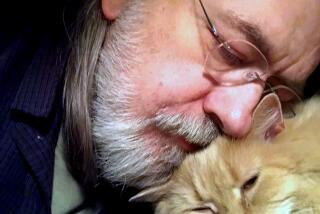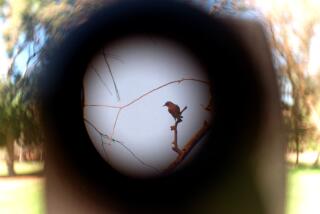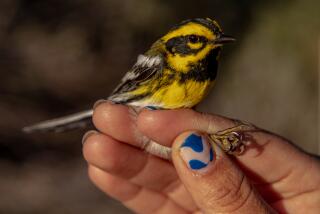The Last Word on Big Bird : Scold If You Will, But I Won’t Change My Mind: That Cockatiel Was a Mean Old Cuss
- Share via
IN ALL THE YEARS I have been writing this column, I have never been so abused by readers as for the little eulogy I wrote for my wife’s cockatiel.
I thought it was an amiable little piece. I conceded that the bird and I had our differences, but I didn’t really bad-mouth him. After all, he bit me once, and I never bit him.
He was not, to tell the truth, a lovely bird. He was mean, shrill and exasperating, to say the best for him. And yet I treated him always with patience and generosity. Almost always.
“It is obvious,” writes a woman named Denise (her last name, unfortunately, is illegible) “that you know nothing about cockatiels.”
At some length she explains how one can tell a male from a female (I wasn’t sure). She observes that when my wife’s cockatiel said “Big deal!” after I shoved him into his cage because he bit me, I should have known that he was a male.
Females aren’t aggressive, she implies, and they don’t talk. That strikes me as a sexist attitude.
She goes on to write, “From your obvious hatred of birds, this would appear to be a good thing. Why is it that people expect a bird that is aviary-reared, purchased at a local pet shop and subsequently never handled to be automatically tame and affectionate? Does that make sense?
“Cockatiels,” she continues, “are one of the most affectionate species of birds you could ever hope to own.”
Denise also notes that cockatiels are not from South Africa, as I said they were, but from Australia. The Encyclopaedia Britannica says they occur also in South Africa. I feel rather sure that my wife’s cockatiel was African.
Dana Dovitch of Studio City remarks that birds, unlike dogs and cats, have rather a magical hold on human beings.
“One rarely has the opportunity to touch a bird. . . . It’s like having a butterfly land on your shoulder.”
A nice thought. On the contrary, I did not think that Big Bird was nice. He was, as I have said, mean. But butterflies landing on one’s shoulder is a pleasant thought indeed. One landed on my shoulder once, in our back yard. He (I suspect it was a male) was a yellow monarch. He was beautiful, and he didn’t seem to be afraid of me. There was no reason why he should have been; I bore him no malice.
Dovitch adds: “In case your wife decides to purchase another cockatiel (actually, I think you should buy one for her), this is the trick. You must buy one that has been raised as a ‘hand-fed’ bird. I don’t mean fed hands, but fed by hand from birth. This way the bird gets to know and love people. Kind of like Dr. Konrad Lorenz and his geese, or whatever they were.”
Yes, they were geese. Or, to be more precise, goslings. As I recall, he became so acquainted with his goslings that they thought of him as their mother and were closely bonded to him. It is also interesting, just incidentally, that a gosling is a young and inexperienced or foolish person.
Mary S. Cappadonna of Carlsbad accuses me of “provoking angry corrections from your readers, who thus write part of your column for you. I have refrained from writing to you about your mistaken assumptions about cats and Lord Peter Wimsey, but after your column of Jan. 13, I can no longer avoid writing to you.” She, too, says that cockatiels originate in Australia, “as do their even noisier cousins, the cockatoos.”
Cappadonna grants that cockatiels are difficult. “I concede that you are correct about the noisiness of cockatiels and their aggression. I learned early on not to wear jewelry around Bonnie, as he was fond of attacking shiny objects.” Bonnie may seem an odd name for a male, but her first cockatiel, she says, was (probably) a female named Clyde.
One thing about birds that is often overlooked is that they are predatory. In fact, they are descended from dinosaurs--notoriously predatory creatures.
Birds eat insects. Insects are not generally loved. They are generally despised, but they are interesting little creatures, and some (dragonflies, for instance) are pretty.
My friend Julian Donahue, assistant curator of entomology (that’s bugs) at the Los Angeles County Museum of Natural History, loves insects. He understands them. Recently he advised me against bombing my bedroom to rid it of tiny little brown bugs. “They’ll go away,” he said.
When wasps infested our front porch, Julian and his wife, Kathy--head of history and special collections of the Louise Darling Biomedical Library at UCLA--came by to help us. They said the wasps would go away. They did, too, like the little brown bugs.






